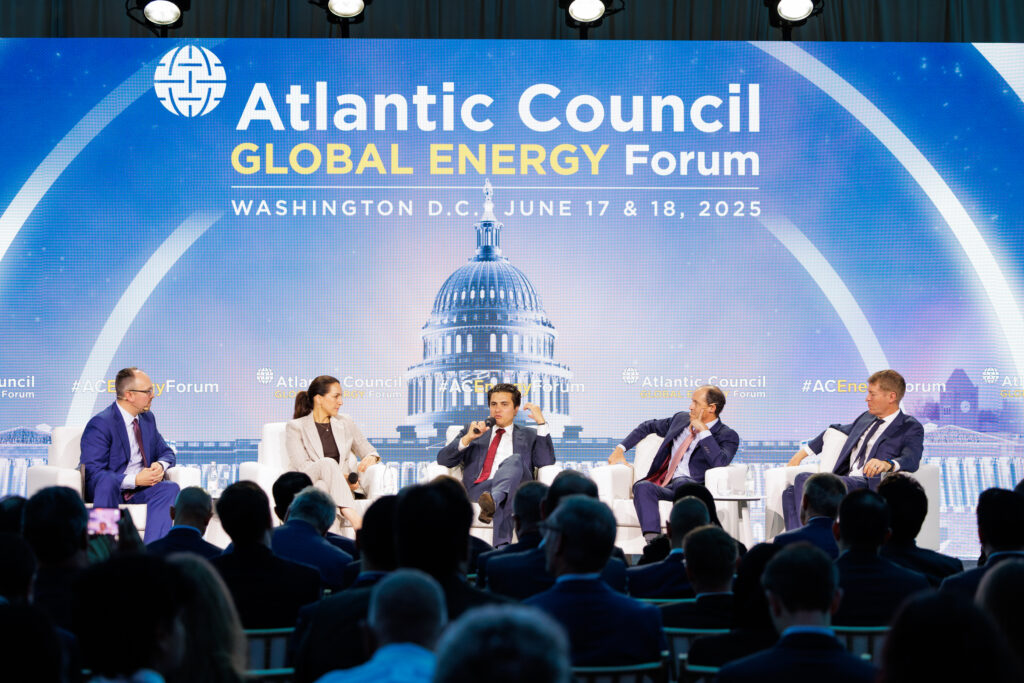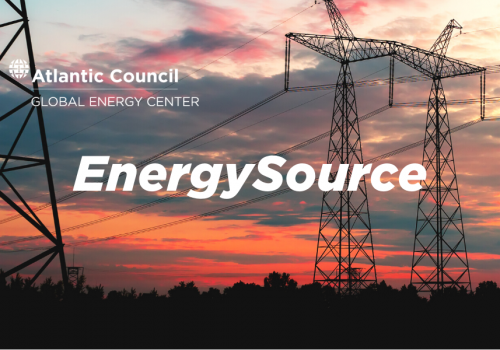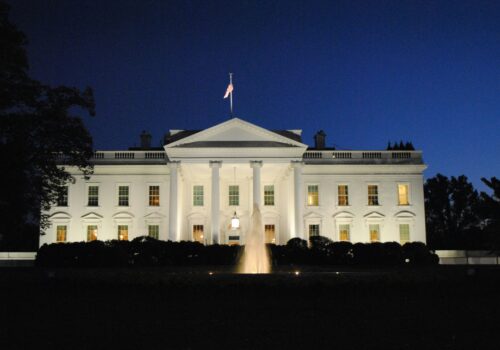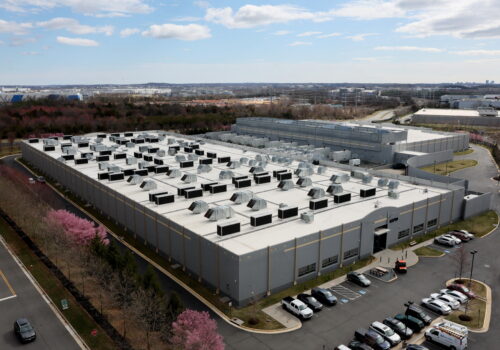The Atlantic Council’s flagship Global Energy Forum opened today in Washington, DC, bringing together top energy and policy leaders at a critical moment for global energy strategy. These experts and policymakers weighed in on the increasingly complex landscape of energy policies amid intense competition to win the artificial intelligence (AI) race, rising geopolitical tensions, and divergent national priorities.
On AI and energy: ‘Infrastructure is destiny‘
In the first panel of the Forum, “Thinking big and building bigger,” Global Energy Center (GEC) Senior Director and Morningstar Chair Landon Derentz led a conversation on meeting the energy demands needed to power AI. The discussion featured Mariam Almheiri, group chief executive officer of 2PointZero and chair of the international affairs office of the Presidential Court of the United Arab Emirates (UAE); Chris James, founder, chief investment officer, and chairman of Engine No. 1; Chris Lehane, OpenAI’s chief policy officer and vice president of global affairs; and Chase Lochmiller, co-founder, chief executive officer (CEO), and chairman of Crusoe.
“AI and energy are inextricably linked,” began Derentz, outlining the challenge that industry and policymakers face in needing to “smash through the bottlenecks” to enable technological progress. Lehane reflected on the energy-related challenges OpenAI grappled with as it became the fastest digital platform in history to reach 100 million users. On lessons learned, Lehane stated that “infrastructure is destiny,” and that AI breakthroughs can only happen when providers are able to bring together “chips, data, talent, and energy” to facilitate this game-changing technology. Lochmiller suggested that AI can help unlock a “new era of abundance”—but before material abundance can be reached, energy abundance is needed to make that a reality.
James continued by defining the obstacles in meeting AI’s energy demands. “Energy is a fairly linear system, but the demand for compute is exponential.” James advised that if policymakers and industry can overcome bottlenecks such as project permitting, outdated regulations, and credit availability, they can foster “an enormous amount of reindustrialization across the United States.”
Almehri then contextualized the international trends that preceding speakers had identified. “When I think of creating AI clusters, there are certain elements that regions have to combine,” she said, ranging from their ability to channel strategic investments to having adequate infrastructure and energy. Citing the UAE’s relevant advantages, Almehri counseled that “for this AI megatransition, we need a transformation on the energy side”—to do that, she continued, requires partnerships.
Derentz continued by asking panelists about the timelines, regulatory hurdles, and geopolitics associated with AI growth. “The age of intelligence is incredibly resource intensive,” noted Lehane, “and this resource intensity is where we’re seeing bottlenecks.” Lochmiller cited Crusoe’s work in Texas as showing not only that “every aspect of the economy is required,” to realize AI’s potential, but that “every aspect of the economy will benefit.” Regarding international AI rivalry, Almehri highlighted that while the UAE has “made it clear to everyone that we are partnering with the United States,” it is important for major players to cooperate on global tech governance and “work together to build standards.”
Derentz concluded by asking participants the top of the policy wish list. They identified regulatory adaptability, innovative capital solutions, public-private partnerships, and international collaboration. Most fundamentally for the future of AI, is a change in perspective. “It’s a mindset,” said James. “This country is at its best when it thinks big, acts big, and builds big: we need to get back to that.”
Pathways to industrial competitiveness and trade
The panel “Pathways to industrial competitiveness and trade,” moderated by Saphina Waters, director of stakeholder engagement and communication at the Oil and Gas Decarbonization Charter (OGDC), explored the complex intersection of trade, competitiveness, and climate policy—something panelists described as a puzzle with one thousand pieces.
Emphasizing the urgent need to reshore US manufacturing, Sarah Stewart, CEO of Silverado Policy Accelerator, called for an aggressive agenda to “build, protect, and promote” that aligns policy tools with clear construction objectives.
Sasha Mackler, senior vice president and head of strategic policy at ExxonMobil Low Carbon Solutions, noted that the company is focused on strengthening domestic manufacturing and expanding energy exports. He stressed that climate policy must evolve from being just a matter of regulation to one integral to business models.
Participants criticized the absence of a clear, concise, and universally accepted carbon accounting system. Without that system, panelists said international collaboration is hindered and domestic implementation becomes more challenging and that a harmonized, interoperable framework would help simplify climate-related policy and economic planning.
On the European Union’s Carbon Border Adjustment Mechanism (CBAM), Stewart expressed concerns about potential discriminatory effects. She argued that while identical systems are not necessary, interoperability is essential to ensure fairness and global cooperation.
The panelists argued that creating a level playing field for US manufacturers is not just a climate issue—it is a matter of national and economic security. They held that ensuring American industries are not unfairly disadvantaged must be a policy priority.
The makings of a manufacturing powerhouse
The panel “The makings of a manufacturing powerhouse: Legacy strength and new frontiers,” moderated by Neil Brown, nonresident senior fellow at the GEC and managing director of KKR Global, explored how manufacturers are navigating today’s complex geopolitical landscape, focusing on capital flows, project financing, and talent development.
One of the central topics of discussion was the strategic role of emissions accounting. Karthik Ramanna, co-founder and principal investigator at the E-Liability Institute, suggested that when carbon accounting is viewed merely as a reporting requirement, it tends to become a burden. He argued, however, if reframed as a tool for product differentiation, it can become a source of value creation. Brandon Spencer, president of the motion business area at ABB, added that using emissions data in a strategic—not just operational—way can become a real competitive advantage for companies.
Catherine Hunt Ryan, president of manufacturing and technology at Bechtel, presented a two-part framework for managing complexity: “what to continue” and “what to consider.” Companies should prioritize core competencies, she said, particularly in engineering and subject-matter expertise, while also identifying and managing critical supply chains and building data-driven execution models. At the same time, organizations must consider their ability to embrace change in a dynamic global environment.
Looking ahead to the next decade, the panel discussed which regions are likely to emerge as manufacturing leaders in this new geopolitical context. Julian Mylchreest, executive vice chairman at Bank of America, remarked that the United States is well positioned to be among the winners.
Leveling the global playing field
In a leadership spotlight moderated by Dan Brouillette, former US secretary of energy, Sen. Bill Cassidy (R-LA) emphasized that the world must adapt to new geopolitical realities. China has gained a competitive edge by not enforcing environmental or pollution standards, allowing it to strengthen both its economy and military. Meanwhile, the United States and European Union have adopted stringent climate regulations, putting their industries at a relative disadvantage. Cassidy also argued that differing regulatory regimes have created an unfair global marketplace. He proposed leveling the playing field with a US version of CBAM: a foreign pollution fee. This fee would apply to imports from countries that do not adhere to US environmental standards, helping to protect domestic industry and workers.
Cassidy highlighted the strategic importance of producing natural gas domestically. He noted that natural gas supports manufacturing, replacing coal and thereby reducing emissions. Moreover, argued Cassidy, by producing gas domestically, the United States can support economic policies, which supports US working families.
Unlocking energy abundance to enable equitable access
To wrap the first day’s panels, Phillip Cornell, GEC nonresident senior fellow and principal at the Economist Impact, moderated a discussion on creating abundant, affordable, and reliable energy to sustain economic growth, foster innovation, and promote national security. The panel featured Jude Kearney, member of the board of advisors at the African Energy Chamber; Tarik Hamane, CEO of Morocco’s National Office of Electricity and Drinking Water; Thomas R. Hardy, acting director of the US Trade and Development Agency (USTDA); and Bob Pérez, Baker Hughes’ vice president for strategic projects.
Cornell framed achieving abundance as “one of the most consequential energy questions of our time.” With 800 million people across the globe still lacking access to electricity while technology-related demand grows rapidly, Cornell said it is crucial to “build systems that can deliver energy abundantly, equitably, and affordably.”
Hardy discussed USTDA’s role in fostering energy abundance through international partnerships. While administrations change, Hardy noted, USTDA continues to work on projects that contribute to US security and prosperity, “working with our partners and meeting them where they are” to grow different forms of energy supply.
Next, Kearney elaborated on Africa’s role in achieving abundance. Advising that access is key, he highlighted the need for an “abundance of thoughtfulness and good governance.” Pérez, offering a private sector view, added that the formula for abundance, ultimately, is rather simple: “I’ve never seen a good project not get money,” he said, “the question is how you get to a good project.”
Finally, Hamane expanded on the theme of partnerships by sharing lessons from Morocco. The country has achieved near-universal rural electricity access, up from less than a quarter only three decades ago. As Morocco looks to build infrastructure that can connect its growing renewable production to new markets in Europe and Africa, Cornell concluded by lauding these projects as a “a physical manifestation of the integration needed to achieve abundance.”
2PointZero, ABB, Baker Hughes, Bank of America and ExxonMobil are sponsors of the Atlantic Council’s Global Energy Forum. More information on Forum sponsors can be found here.
Elena Benaim is a nonresident fellow with the Atlantic Council Global Energy Center.
Paddy Ryan is a former assistant director with the Atlantic Council Global Energy Center. He is a senior writer/editor at the University of California Institute on Global Conflict and Cooperation.
MEET THE AUTHOR
RELATED CONTENT
OUR WORK

The Global Energy Center develops and promotes pragmatic and nonpartisan policy solutions designed to advance global energy security, enhance economic opportunity, and accelerate pathways to net-zero emissions.
Image: Panelists sit on a stage talking. (Atlantic Council, https://www.dropbox.com/scl/fi/8epsig6im8f5ze9506l4d/2025_06_17_ac_elmanstudio-8693.jpg?rlkey=zg6zx7ocu4ttwkiv8rg8vgkzn&st=izfkb2ko&dl=0)






